Samskrita Samunmesha, a three-day National Sanskrit Convention with the motto of carrying the Sanskrit to the grassroots level, was organized as a part of Azadi Ka Amrit Mahostav by the Ministry of Culture, Govt. of India and Sahitya Akademi, New Delhi with the association of National Sanskrit University, Tirupati and Samskruti Foundation, Mysore, from 12-14 July 2023 at Indoor Stadium, National Sanskrit University, Tirupati.
The three-day National Sanskrit Convention began with Samskrita Shobhayatra on 11 July 2023 with huge number of both faculty and students of National Sanskrit. University, Sri Venkateswara Vedic University and Samskrita Bharati, Tirupati. The procession began from the National Sanskrit University campus and by holding the placards, the students actively participated by chanting the Sanskrit slogans that attracted everyone. The procession covered the busiest circles of Tirupati city with the protection of the police.
The curtain-raising ceremony of the three-day programme was held on 12 July 2023 by the Chief Guest, Sri Arif Mohammed Khan, by inaugurating the exhibitions, Sahitya Akademi Book Exhibition, National Sanskrit University Book Exhibition, Spoken Sanskrit Book Exhibition of Samskrita Bharati, Tirupati, Palm Leaf Exhibition, Sanskrit and Scientific Exhibition, Vedic Sacrifice Exhibition, Exhibition of things with Sanskrit words, Epigraphical Sanskrit Inscription Exhibition, etc.
The formal inauguration of Samskrita Samunmesha, the three-day National Sanskrit Convention, was started with the lighting of the lamp by the dignitaries on the dais along with Sri Arif Mohammed Khan, the Chief Guest. Dr. K. Sreenivasararo, Secretary, Sahitya Akademi, New Delhi, welcomed the guests, participants, and students, and explained the high significance of the Sanskrit language.
Inaugural Session
He said that Sanskrit is one of the ancient and scientific languages in which profound knowledge is explained simply. After that, Prof. G.S.R. Krishna Murty, Vice Chancellor, National Sanskrit University, Tirupati, explained the purpose of this National Sanskrit Convention and emphasized the contemporary relevance of the language.
Later, Sri N. Gopalaswamy, the Chancellor of the University, said that this programme is being conducted with the aim of imparting modern things in Sanskrit to the present generation by creating awareness in such a way that everyone can understand the importance and relevance of the Sanskrit language through this Convention.
Later, Mrs. Ranjana Chopra, Additional Secretary and Financial Advisor, Ministry of Culture, Govt. of India, the guest of honour, said that the Sanskrit language is well propagated and transmitted to the people and organizing this convention with the intention of bringing Sanskrit closer to the common people is a wonderful idea.
Smt. Uma Nanduri, Joint Secretary, Ministry of Culture, Govt. of India, Guest of honour, explained that the aim of this is to make Sanskrit the language of the people. After that, Sri AV Dharma Reddy, Executive Officer, Tirumala Tirupati Devasthanams, said that through Tirumala Tirupati Devasthanams, the Sanskrit language is being broadcast every day through Sri Venkateswara Bhakti channel through various anecdotes, and informed that Sanskrit is being presented to everyone. Moreover, during the corona period, the change in the breathing process was shown to the corona victims through the chanting of richas from the Vedas through a video.
Sri Arif Mohammed Khan, Chief guest, said that this National Sanskrit University is resting under the feet of Lord Sri Venkateswara Swamy. He specially congratulated the Ministry of Culture, Sahitya Akademi, National Sanskrit University, Tirupati, and Samskriti Foundation, Mysore for organizing this national gathering.
After describing the greatness of Sanskrit language, he informed that the Sanskrit language is very important for Sanatana Dharma, culture and ideal way of life. He said that Indian culture survives today only through Sanskrit language. Vishwakavi Rabindranath Tagore said that I love India very much because through the Sanskrit language, Indianism and orthodox sages, etc. It is explained that many important things and knowledge are treasured in it. If the question arises as to how India should be identified, then Tagore's words that India's superiority is communicated through the Sanskrit language are taken for example. Defining the word Purana, Pura Api Navam (ancient yet eternally new) describes the greatness of this Purana. India is India and Without Sanskrit, India is not India. Moreover, Adisankaracharya of our state of Kerala established four Mathas in East, West, South and North thereby spreading the knowledge of Sanskrit in the four directions throughout India. Although India is different in terms of culture, traditions, and spirituality, we are all one. It is explained that “Vasudhaiva Kutumbakam” is revealed through the Sanskrit language.
He explained that through such National Conventions Sanskrit language will be more accessible to the common people. Later the Vice-President of Sahitya Akademi Prof. Kumuda Sharma briefed the views expressed by all the speakers who attended the program and explained that through Sahitya Akademi Indian culture and Sanskrit are accessible to everyone by organizing such important programs. Scholars of different walks of life have taken part along with the faculty and students of National Sanskrit University.
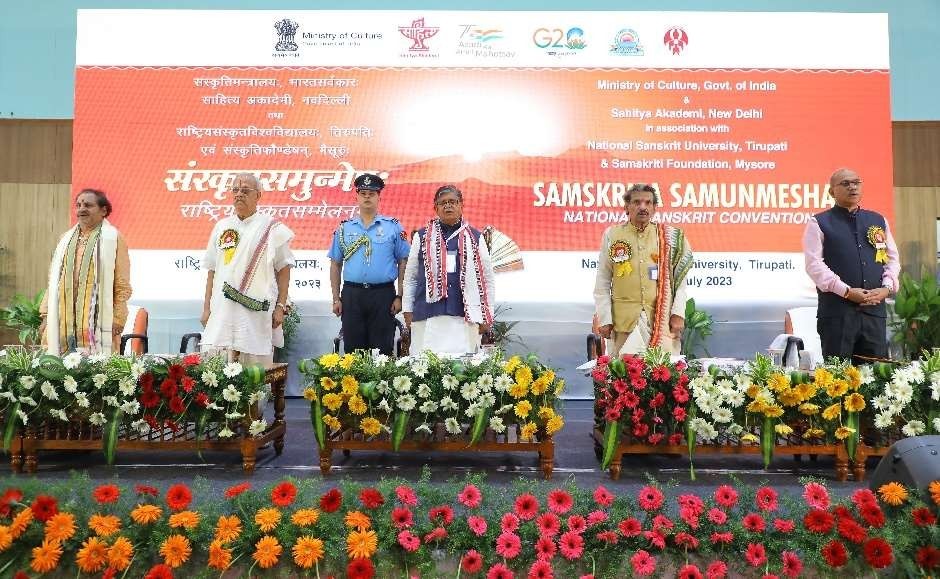
The first session of the National Sanskrit Convention started at 2.30 pm and Sri Gulab Chand Kataria, Hon’ble Governor of Assam was the Chief guest. The session began with the welcome address of Dr. K. Sreenivasarao, Secretary, Sahitya Akademi. He said that the Sanskrit language has given great knowledge to India 3000 years ago. The sources of traditions of Jainism and Buddhism were founded in Sanskrit only. So many scientific subjects are explained in the Sanskrit language. He explained that this National Sanskrit Convention was organized to hold many discussions on modern issues. Dr. Madugula Nagaphani Sarma, a well-known Avadhani, explained the excellence of the Ashtavadhana process and mesmerized both dignitaries and the audience with poems.
Sri N. Gopalaswamy, Chancellor, of National Sanskrit University said that the students should learn about the great things involved in the Ashtavadhana process, Kavitvarachana, and other processes, etc. He informed me that this program is very useful for everyone to learn the Sanskrit language through this combination. Later, Prof.G.S.R. Krishna Murty, Vice-Chancellor of National Sanskrit University, said that through this National Convention, our aim is to connect Sanskrit with modern subjects and provide the required knowledge to the present generation.
Shri Gulab Chand Kataria, Hon’ble Governor of Assam, the Chief guest of the session, said that studying the Sanskrit language means studying the Indian culture. He informed me that the source of Indian culture is the Sanskrit language. Religions such as Jainism and Buddhism texts found their roots in the Sanskrit language only. Languages like Prakrit, Pali, etc. have sources in Sanskrit. Ayurveda-Yoga-Medicine, etc. is based on the Sanskrit language.
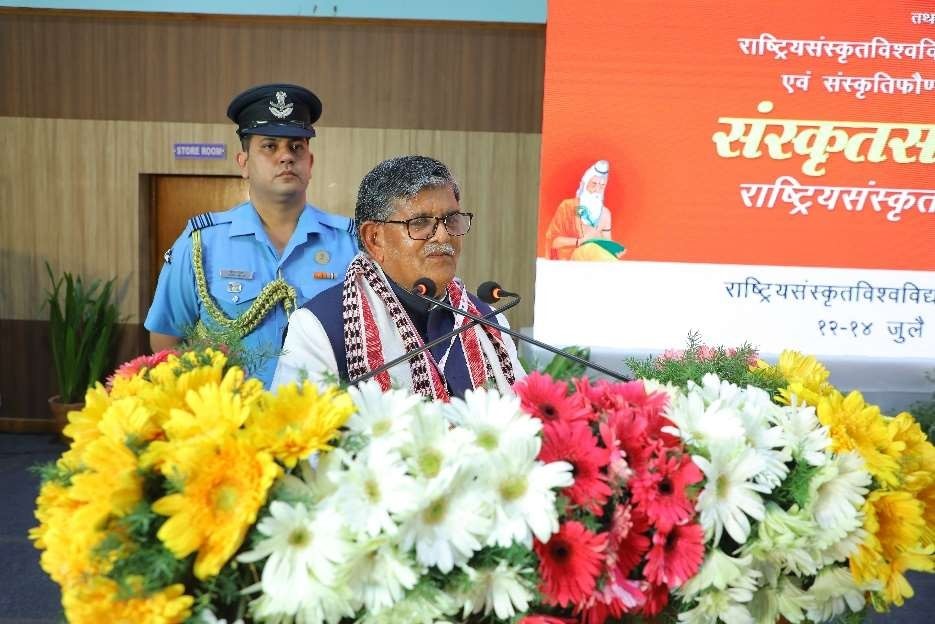
He informed us that even the most modern things in Sanskrit are mysterious, truths of life, the best personality, etc. needed by the youth in the present times was described by our sages in ancient times through the Sanskrit language. The Sanskrit language is hailed as a guide for the modern generation. The Sanskrit language is a bridge between the past and future. It has been explained that this kind of National Sanskrit Conventions contributes a lot to the enunciation of the Sanskrit language. It was suggested that everyone should study Sanskrit and preserve Indian culture.
Ashtadhatanam
Later, the Ashtavadhanam began with Avadhani Dr. Madugula Nagaphani Sarma, wherein Prof. M.A. Alwar, Sri U. Bharat Sharma, Prof. K.S.Kannan, Prof. K. Ramasurya Narayana, Prof. G.S.R. Krishna Murty, Prof. Rajagopalan, Prof. C. Ranganath, Prof. Narayana Pujar P. and Ms. Madugula Sukapriya participated as Pruchchakas. Prof. Sankara Narayana coordinated the same.
The Second session of the convention began with Poets’ Meet and the session was chaired by Prof Abhiraja Rajendra Mishra, distinguished Sanskrit scholar and Prof. Harekrishna Satapathy, Convener, Sanskrit Advisory Board of Sahitya Akademi was the special guest of the session. Prof. K. Ramasuraya Narayana, Prof. Rani Sadasiva Murty, Prof. P.C. Muraleemadhavan, Dr. Ranga Ramanujacharya, Prof. Vindhyeswari Prasad Mishra, Prof. M.A.Alwar, and Dr. B. Aparna participated as poets and readout the recently written poems focused on various aspects of the world.
The third session was devoted to Harikatha on Durvasa Aatithyam of the Mahabharata performed by Dr. Shankara Bhat Unchalli, a renowned Sanskrit scholar and Harikatha artist of Karnataka. He enthralled the audience with the flow of Sanskrit endowed with a mellifluous voice that caught the attention of everyone.
The first of the three-day National Sanskrit Convention came to an end with Dhruvaa Sanskrit Band Concert by Dr. Sanjay Dwivedi and fellow artists.
DHRUVAA SANSKRIT BAND
DAY 2
The second day of Samskrita Samunmesha, a three-day National Sanskrit Convention began on 13 July 2023 from 10.00 am onwards with the fourth session featuring a panel discussion on Sanskrit and Computer Science wherein Prof. Girish Nath Jha, an eminent Sanskrit scholar chaired the session and also presented a paper on Natural Language Processing and Sanskrit. Dr. P. Ramanujan on Speech synthesis and speech recognition, Prof. K. Ramasubramanian, eminent Sanskrit scholar of IIT Mumbai on Artificial Cognition, Dr. P.Venkatasubramanian on Indian Cryptographic System, and Dr. R.V.S.S. Avadhanulu on Sanskrit and Artificial Intelligence presented their papers.
The fifth session was devoted to a panel discussion on Sanskrit and Health Sciences o 13 July 2023 from 2.30 pm onwards under the chairmanship of eminent Ayurveda expert Prof. B. Gurubasavaraja. In this session, Sri G. G. Gangadharan on Sanskrit for Ayurveda and its Contemporary Relevance, Sri Manoj Shankaranarayana on the Importance of Sanskrit aries in Understanding concept of Arogya and Anarogy, Sri S. Venugopalan on Wellness in Vedas and other scriptures presented their papers.
Later, Prof.G.S.R. Krishna Murty, Vice-Chancellor, of National Sanskrit University, said that Sanskrit is the compass of Indian healthcare and the Charaka Samhita, Susruta Samhita, and other Ayurvedic scriptures are in Sanskrit explained, thousands of years ago, about health care of human life and he also felicitated all the invited participants of the session.
The sixth session devoted to a panel discussion on Sanskrit Yogic Science began on 14 July 2023 from 2.30 pm onwards and was chaired by Prof. H.R. Nagendra, the Chancellor of S-Vyasa University. In this session, Sri H.S.Vadiraja on the Role of Sanskrit in the Study and Practice of Yoga, Prof.K.Ganapathi Bhat on Yoga, as Narrated by Sri Krishna in Bhagavad Gita, Sri Mohan Raghavan on An Exploration of Yogic Sanskrit Lexicon in the Context of Modern Medicine and Wellbeing , presented their papers.
The Seventh session was devoted to Sanskrit Storytelling by children and began on 13 July 2023 from 4.00 pm onwards. Dr. Janardan Hegde, an eminent Sanskrit writer chaired the session. M.N.Samskruti, B.S. Vishrut, Lalitha Dhee Manogna Somani, Balarama Krishna Somasi, M. Sivatmika Yadav, D. Keerti Priya, and V. Hemanth Sai enthralled the audience with their narration of stories in Sanskrit.
The Eighth session was devoted to Harikatha's performance on Sundara Kanda of the Ramayana. The performance was rendered by Ms. Vishakha Hari, an eminent Sanskrit scholar, who mesmerized the audience with her both Musical skill as well as Sanskrit language endowed with content. At the end of her performance, Dr.K.Sreenivasarao, Secretary, Sahitya Akademi, felicitated and thanked them.
The Third of Samskrita Samunmesha, the National Sanskrit Convention began on 14 July 2023 from 10.00 am onwards with the Ninth session devoted to Sanskrit and Indian Music in Lecture cum Demonstration method. This session was chaired by Dr. T.S. Sathyavathi, eminent Music and Sanskrit scholar. In this session, Dr. Rani Nagasri Saileswari on Carnatic Music, Sri Narasimhalu Vadavati on Hindustani Music, Prof. Rani Sadasiva Murty on Folk Music, and Sri Prateek Pattanaik on Odissi Music presented their papers with demonstrations.
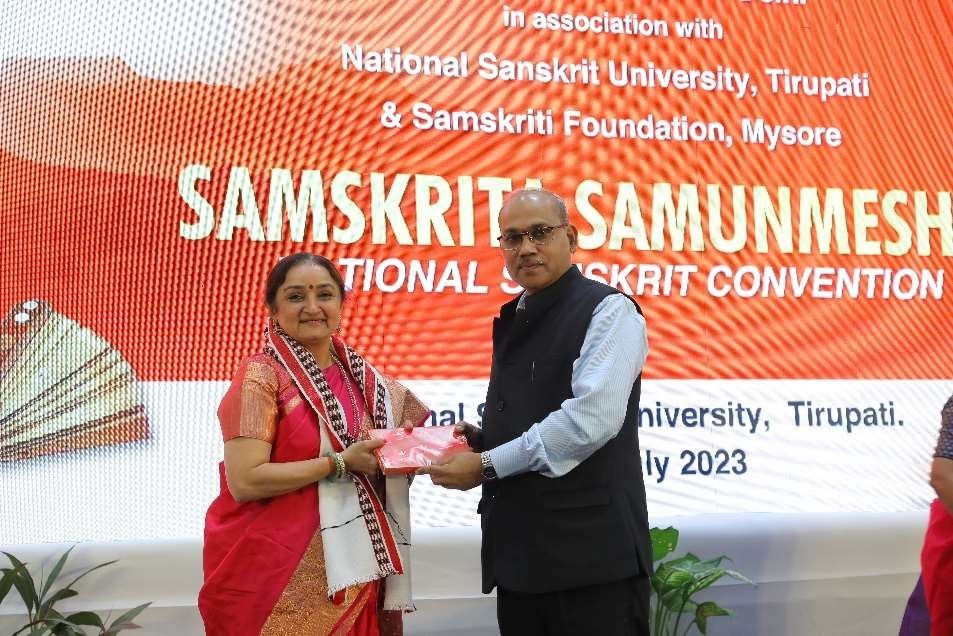
The Tenth session devoted to Sanskrit and Dance with Lecture cum demonstration began on 14 July 2023 from 2.30 pm onwards being chaired by Dr. Sandhya Purecha, Chairman, Sangeet Natak Akademi, New Delhi. In this session, Ms. Yamini Muthanna on Bharatanatyam Dance, Ms. Shaleena C on Kathak Dance, Dr. Yashoda Thakore on Kuchipudi Dance, and Ms. Kavita Dwivedi on Odissi Dance enthralled the audience with both lecture and performances and became the centre of the attraction of the convention.
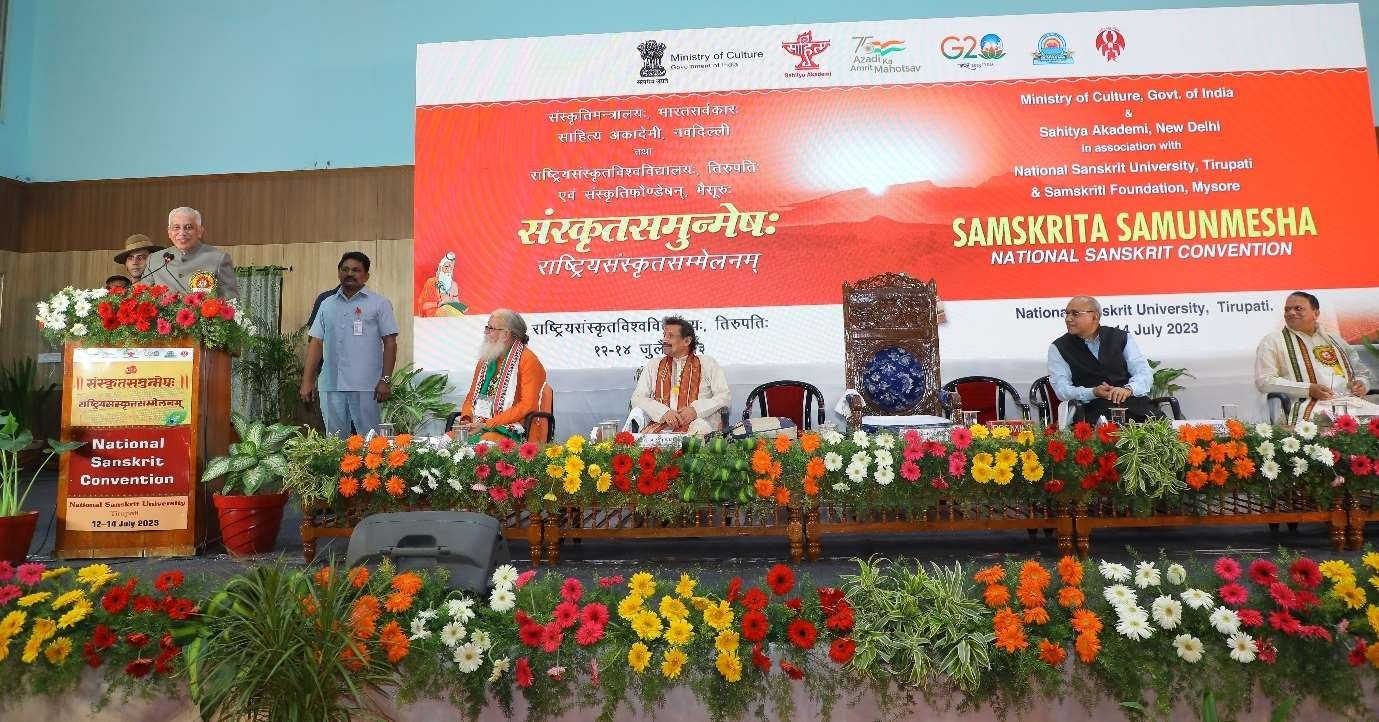
The valedictory session of Samskrita Samunmesha began on 14 July 2023 from 5.30 pm onwards. Sri S. Abdul Nazeer, Hon’ble Governor of Andhra Pradesh, the Chief Guest of the session visited the exhibitions and later, participated in the valedictory ceremony. The session began with felicitation to the Hon’ble Governor by Dr. K. Sreenivasarao, Secretary, Sahitya Akademi, and also formally welcomed the dignitaries for the same. Prof. G.S.R. Krishna Murty, Vice Chancellor, National Sanskrit University made the concluding remarks. Later, Sri S. Abdul Nazeer, Hon’ble Governor of Andhra Pradesh, addressed the gathering.
The valedictory address highlighted the prominence of Sanskrit right from the Vedic period and explained how Sanskrit is the source of various streams of knowledge. He categorically mentioned that the knowledge of Sanskrit opens a vast treasure of manuscripts, but to benefit by it, we need to develop a synergy between the ancient Indian tradition and modern science and technology. Languages emerged out of it and it had a deep impact on many languages and cultures that were not even geographically connected to the Indian sub-continent. Celebrated as Devabhasha, Sanskrit is one of the most musical and also self-sufficient languages of the world. He quoted Mahatma Gandhi: Without the study of Sanskrit, one cannot become a true Indian and a true learned man. He congratulated everyone for organizing this convention. Prof. Harekrishna Satapathy, Convener, Sanskrit Advisory Board of Sahitya Akademi proposed a vote of thanks.
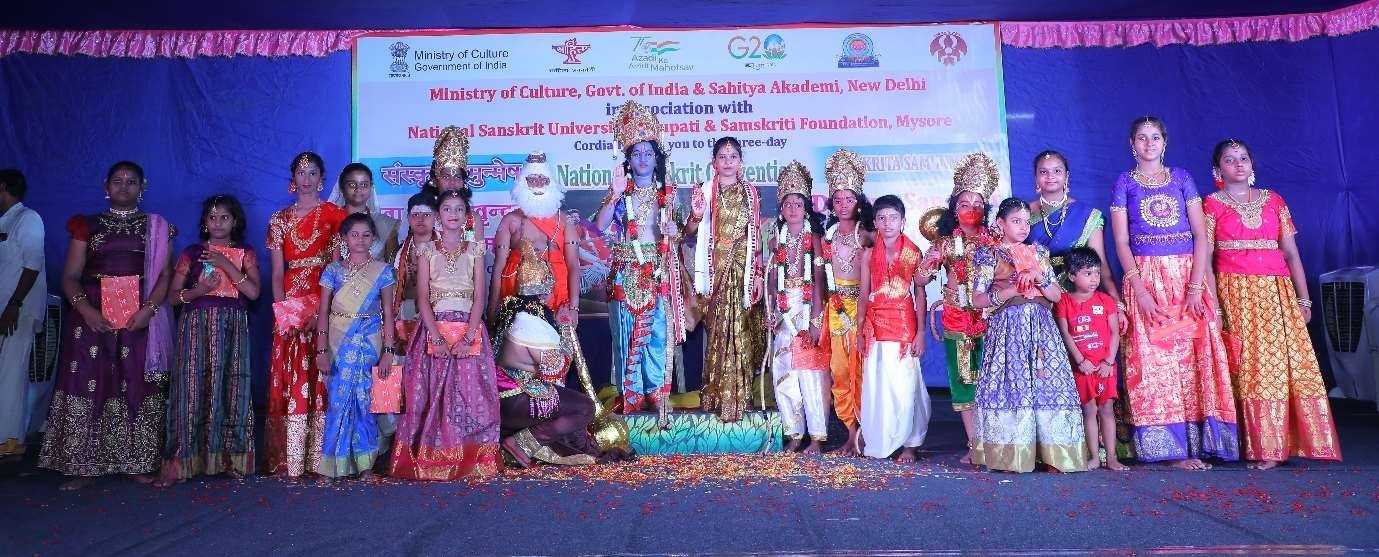
The final and Eleventh session devoted to Sanskrit Drama by children began on 14 July 2023 from 7.00 pm onwards. Students of National Sanskrit University presented two one-act plays by Yashwant Dixit and Krishna Mohan whereas Students of Samskrita Bhrati, Tirupati, presented a drama titled Hrudaye Rama Darshanam. Finally, Dr. N.Suresh Babu, Deputy Secretary, Sahitya Akademi, proposed a vote of thanks.